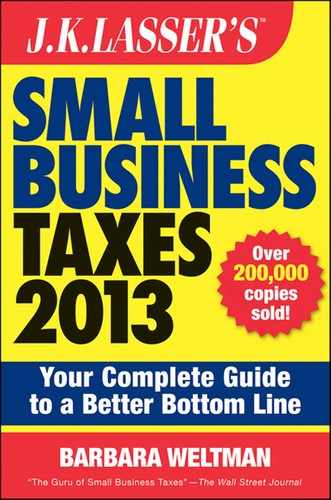Tax Identification Numbers
For personal returns, your Social Security number is your tax identification number. But for business you may have several different numbers.
Your tax identification number is a 9-digit number unique to you. You use this number when filing tax returns, making tax deposits, hiring employees, opening a business bank account, applying for a loan, and setting up a qualified retirement plan. Usually you use a federal employer identification number (EIN) obtained from the IRS as your tax identification number (even if you are not an employer because you do not have any employees).
If you are a sole proprietor (or the sole owner of a limited liability company), you can usually use your Social Security number as your tax identification number on your income tax return. But even this type of business must use an EIN for a business bank account, to report payroll taxes, and to start a Keogh, SEP, or SIMPLE plan. And, in this era of identity theft, you may want to use an EIN if you pay an independent contractor $600 or more for the year and are required to report this income to the IRS and the contractor on Form 1099-MISC, so that you do not have to give your Social Security number to the contractor.
Where to Get Your EIN
You can obtain your federal EIN by completing IRS Form SS-4, Application for Employer Identification Number, online at www.irs.gov and search “EIN Online” (see Chapter 1).
When you apply online, the IRS automatically enrolls you in the Electronic Federal Tax Payment System (EFTPS) (www.eftps.gov). This electronic system enables you to make tax payments, including estimated taxes, through your computer. After automatic enrollment you will receive an enrollment confirmation, along with a PIN and instructions within a few days. You do not have
- Sole proprietors can simply write to the IRS about the change.
- Partnerships should mark the appropriate box on their return for the year (line G, box 3 of Form 1065).
- Corporations should mark the appropriate box on their return for the year (line E, box 3 of Form 1120 for C corporations and line H, box 2 of Form 1120S for S corporations).
State EINs
States may assign their own tax identification numbers (also called business registration numbers) to your business for unemployment insurance reporting for employees and for other purposes, typically at the time you register to do business in your state. For more information about your state EIN, contact your state tax, revenue, or finance department.
If you do business in New York, Massachusetts, and South Carolina, you can register with the IRS and state in 1 step (go to www.irs.gov, search “state and federal online business registration,” and click on the applicable state).
Resale Number Distinguished
Business owners are responsible not only for income and employment taxes, but also for state and local sales taxes on the goods and services they sell. In order to properly remit sales tax that you collect to your state and to avoid paying sales tax on items you buy for resale, you need a resale number (states without sales tax—Alaska, Delaware, Montana, New Hampshire, and Oregon—do not issue resale numbers). Your state sales tax number (called a resale number, a seller’s permit, or sales tax license) is not the same as your federal tax identification number.
Once you have your resale number, your state may permit you to continue to use it as long as you are in business; in other states you must renew the resale number periodically. For information on obtaining a resale number, contact your state tax, revenue, or finance department.
